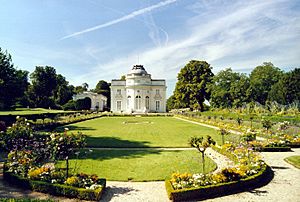Thomas Blaikie (gardener) facts for kids
Quick facts for kids
Thomas Blaikie
|
|
|---|---|
| Born | 11 February 1750 |
| Died | 19 July 1838 Paris
|
| Nationality | Scottish |
| Occupation | Botanist and gardener |
Thomas Blaikie (born 11 February 1750 – died 19 July 1838) was a talented Scottish botanist and gardener. He was born on Corstorphine Hill, which was a countryside area near Edinburgh at the time. Blaikie became famous for designing beautiful gardens, especially in France.
Contents
Early Adventures and Plant Discoveries
Exploring the Alps
Between 1775 and 1776, Thomas Blaikie was given an exciting job. Two important doctors, John Fothergill and William Pitcairn, asked him to travel through the Alps mountains. His mission was to find and record rare plant species. This was a big adventure for a botanist!
While exploring the Alps, Blaikie met some famous people. He met Voltaire, a very well-known French writer and philosopher. He also traveled with Michel-Gabriel Paccard, who later became famous for being one of the first people to climb to the top of Mont Blanc, the highest mountain in the Alps.
Designing Gardens in France
Working for French Nobles
After a short trip back to Britain, Blaikie started working on gardens in France. He first worked for a French nobleman, the Comte de Lauraguais, in Normandy. However, this job ended because he wasn't paid.
In 1778, Blaikie began working for the Comte d'Artois. This count was the younger brother of King Louis XVI. The Comte d'Artois later became King Charles X of France. Blaikie's most famous work for him was designing the gardens of the beautiful Château de Bagatelle. Another designer, François-Joseph Bélanger, made some changes to fit French styles, and Blaikie oversaw the planting of all the trees and flowers.
More Garden Projects
While still working for the Comte d'Artois, Blaikie also created a garden for Sophie Arnould. She was a very famous opera singer of her time.
In 1780, another important French noble, the Duc de Chartres, hired Blaikie. This duke later became known as the Duc d'Orléans and then Philippe Égalité. Blaikie designed several of his gardens, including the special Winter Garden at the Parc Monceau in Paris.
Challenges and Later Life
Impact of the French Revolution
The French Revolution (which started in 1789) caused big problems for Thomas Blaikie. His employers, the French nobles, could no longer pay him. Many of his garden design contracts stopped. He also lost money from investments and, in 1792, his house was robbed, and he lost a lot of valuable property.
Because of these financial troubles, Blaikie had to go back to working for the Comte de Lauraguais's family, helping manage their property. He continued to have disagreements about his pay.
Royal Pension and Final Years
Things improved for Blaikie in 1826. He received a royal pension, which was a regular payment from the government. This payment was secured by the new Duc d'Orléans, who would later become King Louis Philippe I of France.
Thomas Blaikie passed away in 1838 in his home in Paris. He left behind a legacy of beautiful gardens that are still admired today.
See also
- Château de Bagatelle
 | Selma Burke |
 | Pauline Powell Burns |
 | Frederick J. Brown |
 | Robert Blackburn |


